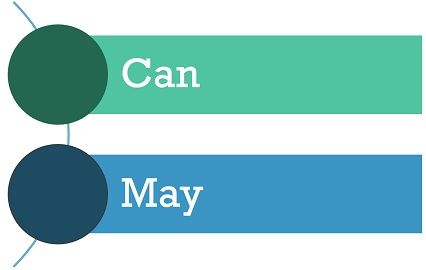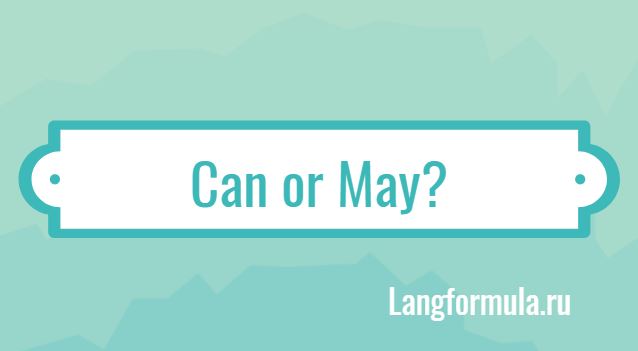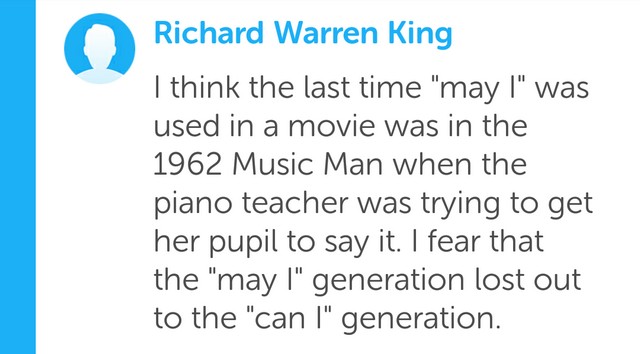Вопрос какой глагол использовать can или may может возникнуть, потому что в русском языке мы используем такие слова, как «могу», «можете» там, где в английском встречаются и can, и may, например:
May I ask you something? — Могу я вас кое о чем спросить?
Can you wait for a while? — Вы можете немножко подождать?
В этой статье мы рассмотрим, когда нужно говорить can, а когда may и в чем между ними разница.
Если очень коротко, то основная разница в том, что can обычно подразумевает физическую возможность что-то сделать, а may — разрешение, позволение. Иначе говоря «I can» похоже на «Я могу», а «I may» похоже на «Мне можно».
I can lift a car. — Я могу поднять машину (могу физически).
I may eat all the cookies. — Мне можно съесть все печенье (мне разрешили).
Но есть и другие нюансы, рассмотрим их подробнее.
Когда мы говорим Can?
Сначала разберем случаи, когда мы говорим can.
- Физическая возможность что-то сделать.
I can breath underwater. — Я могу дышать под водой.
Tomas can sleep four hours a day and feel well. — Томас может спать четыре часа в день и чувствовать себя хорошо.
I can’t help you. — Я не могу вам помочь (у меня нет возможности).
- Умение что-то делать.
Подразумевается не просто физическая возможность, а наличие навыков.
Can you ride a horse? — Вы умеете ездить верхом?
I can’t play basketball. — Я не умею играть в баскетбол.
- Вопрос о физической возможности или умении.
Задавая вопрос, вы спрашиваете не о том, разрешено ли, например, самолету летать в космосе, а способен ли он на это физически.
Can an airplane fly in the space? — Может ли самолет летать в космосе?
Can you play the piano? — Вы умеете играть на пианино?
- Выражение удивления, сомнения, недоверия
Подробнее об этой функции глагола can читайте в статье «Модальный глагол Can, Could».
Can it be the truth? — Разве это может быть правдой?
No way, you can’t have done it! — Не может быть, ты не мог такого сделать!
Когда мы говорим May?
- Предположение о какой-то вероятности, возможном действии.
В этом случае наравне с may часто используется might с незначительной разницей в значении (если might, то возможность представляется чуть мене вероятной).
Take an umbrella, It may/might rain tonight. — Возьми зонтик, вечером, возможно, пойдет дождь.
The table is reserved but there might be another option. — Этот столик заказан, но, возможно, есть другой вариант.
- Разрешение и запрет (old school English).
В строго правильном английском «старой школы» разрешение и запрет выражаются с помощью may
May I suggest another decision? — Могу я предложить другой решение?
You may not play in the garden. — Нельзя играть в саду.
Однако в современном английском языке в этих случаях используют и can, и may.
Когда можно сказать и Can, и May?
- Просим или даем разрешение
Dad, can/may I take your car? — Папа, можно я возьму твою машину?
Oh, you finished painting the fence! Well done! You can/may go now. — О, ты уже покрасил забор! Молодец! Можешь идти.
Как я уже упоминал выше, раньше считалось нормой использовать may, чтобы спросить или дать разрешение. Строго говоря, вопрос с can подразумевает физическую возможность, а вопрос с may — разрешение. Есть такая известная шутка: ученик поднимает руку и спрашивает «Can I go to the bathroom?» (могу я сходить в туалет?), а учитель отвечает «I don’t know, can you?» (не знаю, можешь?)
Однако в современном английском языке этих различий уже почти никто не придерживается, наоборот предложения с can в «разрешительном» значении даже более употребительны (об этом говорится в этой статье на Merriam-Webster). Мне однажды встретилось интересное обсуждение в приложении Duolingo, где упоминалось, что поколение «May I» окончательно сдало позиции поколению «Can I»:
- Запрет
В английском языке запрет можно выразить разными способами, самый жесткий способ — must not. Если мы говорим, «You must not cross this line» — это что-то вроде «Вам запрещено пересекать эту линию», то есть речь идет о строгом, категорическом запрете. Выражения запрета с cannot и may более мягкие, но между ними есть небольшая, не всегда существенная разница в значении.
Запрет с can’t значит некое абстрактное нейтральное «запрещено».
I’m sorry but you can’t park here. — Извините, но здесь нельзя парковаться.
You can’t smoke in the park. — В парке нельзя курить.
Запрет с may not может восприниматься как более личный запрет с оттенком назидания, наставления. Что-то вроде «вам запрещается», «вам запрещено», «вам нельзя».
You may not play with Bobby, he is a bully! — Тебе нельзя играться с Бобби, он хулиган!
You may not go the party, you are grounded. — Тебе нельзя (я не разрешаю) идти на вечеринку, ты наказана
Примечание: to ground — наказывать ребенка «домашним арестом».
Здравствуйте! Меня зовут Сергей Ним, я автор этого сайта, а также книг, курсов, видеоуроков по английскому языку.
Подпишитесь на мой Телеграм-канал, чтобы узнавать о новых видео, материалах по английскому языку.
У меня также есть канал на YouTube, где я регулярно публикую свои видео.
Can and may are both used to talk about permission. Using can in this sense isn’t incorrect but it is considered informal. If you want to sound formal, use may.
We all know the joke (or, rather, “joke”): a student raises their hand and asks the teacher “Can I go to the bathroom?” and the teacher responds, “I don’t know—can you?”
A young student prepares to debunk Charles Lurie’s outdated style guide, «How to Say It: Helpful Hints On English.» Yes, you ‘can’ go to the bathroom.
The “joke” here is based on the insistence that you should use may when asking for permission to do something, and can when speaking about ability. By this logic, the student should have said “May I go to the bathroom?” since their ability to use the facilities is likely not in question.
But the reality of the situation is that both can and may have been used historically to refer to permission and continue to be used so today. How did we end up in this situation?
Origin and Meaning of ‘May’
May is the earlier verb, showing up in manuscripts from the 8th century. It originally referred to having strength or power, and then very quickly developed a meaning that referred to ability. This particular meaning is no longer in current use, but we find a late representative of this use in Chaucer’s Canterbury Tales from 1395: “We mowen nat…It ouertake, it slit awey so faste” (“We may not overtake it, it slid away so fast”). May also developed a meaning referring to possibility, which we’re still familiar with today (“I may be able to have lunch with you this Thursday”), and the meaning that schoolteachers insist it has today–one that grants permission (“You may use the bathroom”). All four of these meanings were in use before 1000AD.
Overlap with ‘Can’
Around that time, can came on the scene. It was a verb that originally meant “to know,” and then “to know how to do something,” and then “to have the ability to do something.” This last meaning, which showed up around 1300, was can’s first semantic overlap with may. The overlap continued: by 1500, both can and may were used to refer to ability and possibility.
Given that there was already some overlap between the two words, it’s not surprising that by the end of the 1800s, can also came to mean “to have permission.” (If there’s anything surprising in that, it’s perhaps that it took so long for can to copy that meaning of may’s.)
It didn’t take too long for teachers and grammarians of the day to proscribe that can should only be used of ability and may of permission. We find the rule spelled out clearly (complete with a fictional student-teacher exchange) in Charles Lurie’s 1926 How To Say It: Helpful Hints On English. There is no particular reason for the rule, except for the fact that may has been used longer to mean “to give permission” than can has. Nonetheless, the “rule” lives on.
In reality, can likely has more use in the “permission” sense than is recorded, as it is more informal and so shows up in speech more frequently than may does. May is the more formal word, and if you are at all concerned about being tut-tutted, a safe choice. Can is now the verb of choice for ability, and both can and may are still used in the «possibility» sense. You may use can if you wish, and you can use may if it makes you feel better.
These two words cause a lot of confusion in English and leave writers—and speakers especially—unsure about which word to use and when. Does can have a special function that may cannot be used for? Or are they completely interchangeable?
What is the Difference Between Can and May?
Today, I want to highlight the differences between can and may. I will outline the traditional rule regarding can vs. may, provide you with example sentences for each, and offer some advice going forward in your writing.
After reading this post, you shouldn’t ever again wonder which is correct or which is proper, may or can.
When to Use Can

- Can you do the salsa?
- Can you play basketball?
- He can compose entire symphonies in his head.
- She can run a five-minute mile.
The traditional rule, as you probably learned in grade school, states that can has to do with physical ability or the capacity to do something, not with permission. As such, all of the above sentences could be rewritten by substituting can with able/capable.
- Are you capable of doing the salsa?
- Are you able to play basketball?
You probably remember being a young student and asking the question,
- Can I go to the bathroom?
Your teacher would invariably correct you by saying,
- I don’t know, can you?
This, of course, was an instructional exercise on the part of the teacher, who was attempting to instill the difference between expressing one’s physical ability and a request for permission: the difference between may I vs. can I.
When to Use May

- There may be a storm tomorrow. (Possibility)
- I may attend the festivities this weekend. (Possibility)
- You may borrow my jacket. (Permission)
- If you finish your chores, you may play outside. (Permission)
For a discussion between may vs. might, see our full post on the subject.
Going back to our example from above, what your teacher wanted you to ask was the question,
- May I go to the bathroom?
This is a request for permission and not a statement of ability.
How to Express the Denial of Permission
Up until this point, we have focused on the person asking the question and not the person answering. If someone asks you for permission, what is the proper way to respond?
If the answer is yes, then no thought is given at all.
- May I come inside?
- Yes, you may.
But, if the answer is no, there are a few additional considerations to keep in mind.
A denial of permission is properly phrased formally by saying may not or with cannot or can’t.
- You may not use my car tonight.
- You cannot use my car tonight.
- You can’t use my car tonight.
But, you should not use the contraction mayn’t. Most people are unaware of this contraction to being with, but for those writers/speakers who are, it’s best to avoid it.
Are May vs. Can Interchangeable?
Does it really make a difference whether I use can I vs. may I?

If you are writing a highly formal letter where politeness and cordiality is a primary concern, you will definitely want to adhere to the traditional rule and use may to ask permission.
Similarly, if you are at a fancy restaurant, it might be more appropriate to as your waiter, May I have some more water? instead of saying, Can I have some more water?
May is the more polite option.
If, however, you are surrounded by peers in an informal setting, there is nothing wrong with asking your friend, Can I have another hot dog? at a cookout.
As with most writing and speaking, you need to know your audience and understand what is best for the situation at hand. When you wish to show courtesy, respect, and politeness, use may. When these are not of concern, using can is fine.
It should also be noted that while you can use can instead of the word may to request permission, you cannot use may instead of the word can to express ability.
- I may play basketball. (WRONG)
- I can play basketball. (CORRECT)
To say I may play basketball is a different statement than to say I can play basketball. While the former isn’t incorrect in all of its uses, it is incorrect for the intended meaning in this example. I may play basketball expresses the likelihood or your playing while I can play basketball expressed your ability to play.
Summary
Even if you rarely make the distinction between these words, it’s important to know the difference between may vs. can.
May is used to express possibility or ask permission.
Can is used to express ability and informally used to ask permission.
Contents
- 1 What is the Difference Between Can and May?
- 2 When to Use Can
- 3 When to Use May
- 4 How to Express the Denial of Permission
- 5 Are May vs. Can Interchangeable?
- 6 Summary

On the other hand, may is used to discuss possibility or happenings in the future. It is also used when you want to take or give permission for doing something. Now, let’s move on to our examples to understand the difference between can and may in a better way:
- Can you ride the bike? Or May I ride your bike?
- Joseph can come tomorrow. Or Joseph may come tomorrow.
In this first example, you might have observed that the word ‘can’ is used to know the ability of a person in doing something, whereas ‘may’ is used to ask for the consent. In our next example, both the two discusses the possibility but may represent a strong possibility while can indicates an expectation.
Content: Can Vs. May
- Comparison Chart
- Definition
- Key Differences
- Examples
- How to remember the difference
Comparison Chart
| Basis for Comparison | Can | May |
|---|---|---|
| Meaning | Can refers to the capability of someone in doing something. | May is used in sentence to reflect the possibility or permissibility of something. |
| Permission | Sometimes | Always |
| Context | Informal | Formal |
| Examples | Team A can win this match. | May I go outside? |
| Can you speak clearly? | This may not be true. | |
| Can I have your number? | May I check your bag? |
Definition of Can
The word ‘can’ means ‘be able to,’ it denotes the capability of a person. It is also used for determining the possibility of something or informally ask for permission to do something. Now let’s discuss the usage of can:
- It indicates the ability of a person:
- Can you translate this letter into French?
- She can help us in solving the problem.
- I can do it in the best way.
- To ask for permission:
- You can keep your belongings over there.
- You can take selfies with foreigners.
- Can I get the email ID?
- To request for something:
- Can you pass this message to the manager?
- Please, can I get your notebook for a moment?
- To represent the possibility:
- Can I expect you day after tomorrow?
- If your age is more than 60 years, you can get retirement benefits.
- To give an offer or suggestion:
- Can I bring that book to you?
- Can I play on your behalf?
Definition of May
In English, we use ‘may’ for expressing any kind of possibility, regarding happenings or events that may occur in the future. It is also used to give and take permission to someone to do something. Now, let’s move on to understand its usage, with the help of points given below:
- To represent the possibility:
- The exams may start from the next week.
- She may not like the dress; we brought for her.
- It can be used to seek or receive permission:
- The candidate may bring normal calculators for the exams.
- May I come in, ma’am?
- You may take my book to read
- For wishes and hopes:
- May you achieve new heights of success.
- May you have a happy journey.
- May all your dreams come true.
The points given below are substantial, so far as the difference between can and may is concerned:
- The word ‘can’ and ‘may’ are modal verbs, wherein can is used to denote a person’s ability in doing something or talking about any kind of possibility. On the other hand, may is used to take or give permission to/from another person. Further, it is also used when there is a strong possibility of something.
- Both can and may are used to seek or receive permission, however, may is more usual and formal.
- In general, we use the word can for informally asking for something. Conversely, may is used for formally asking for or allowing something.
Examples
Can
- Can you repair the mobile phone?
- I can call you if you want.
- This can change the way we work.
May
- You may go now.
- May I take your pen?
- You may not use my stuff.
How to remember the difference
The best trick to recognize the difference between can and may is to understand the context in which they are used, i.e. whether we are using it for seeking or giving permission, showing possibility or ascertaining the ability of a person. ‘Can’ determines the ability of a person to do something. ‘May’ is used to ask for permission.
Although, traditionally, can has meant “to be able” and may has meant “to be permitted” or to express possibility, both can and may are commonly used interchangeably (especially in spoken, informal language) in respect to permission. Even the Oxford English dictionary informs us that the permission use of can is not incorrect, but it’s better and more polite to use may in formal situations.
Example: He can hold his breath for 30 seconds.
Meaning: He is able to hold his breath for 30 seconds.
Example: He may hold his breath for 30 seconds.
Meaning #1: It is possible that he will hold his breath.
Meaning #2: He has permission to hold his breath. (This meaning is unlikely.)
Example: May/Can I go to the mall tonight?
Regardless of whether you choose can or may here, it is clear that permission is being requested.
In spoken English, a request for permission is generally answered with can, cannot, or can’t, rather than with may or may not, even if the question was formed using may. (Although mayn’t is a word, it looks and sounds strange even to native speakers.)
Example of Dialogue:
“May I go to the mall tonight?”
“No, you can’t/cannot go.” OR “Yes, you can go.”
Occasionally, you may hear someone say something like, “I cannot but argue when you say such silly things.” The expression cannot but argue is actually an old-fashioned way of saying “cannot help arguing.” You may also hear the expression can but, which means “can only.”
Example: We can but do our best to arrive on time.
Pop Quiz
1. Can/May you imagine a world without war?
2. Can/May I call you for a date?
3. She can/may run faster than anyone else on the team. (able to)
Pop Quiz Answers
1. Can you imagine a world without war?
2. Can OR May I call you for a date?
3. She can run faster than anyone else on the team.
Advertisement
If the article or the existing discussions do not address a thought or question you have on the subject, please use the «Comment» box at the bottom of this page.




